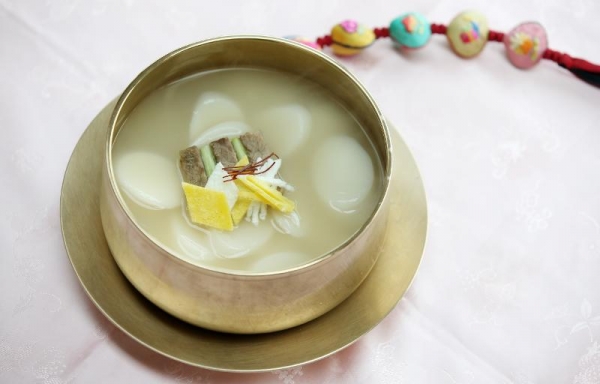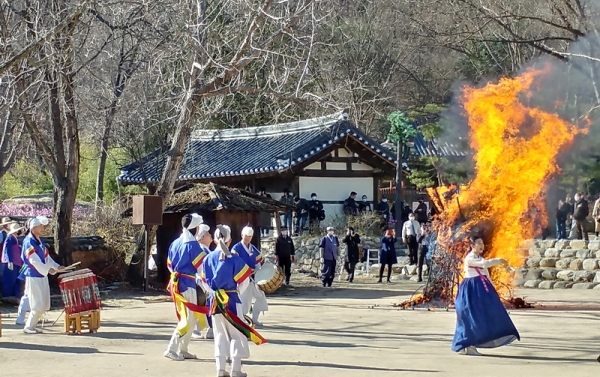
Elias Molina, a Costa Rican staff member of Korea.net's Spanish-language section, has lived in Korea for 13 years. Eight-year resident Anais Faure from Guatemala handles the website's social media. And Aisylu Akhmetzianova from Russia is part of the company's Russian-language section with four years of living in the country.
All three on Jan. 25 gave their thoughts on Seollal (Lunar New Year) at Korea.net's open studio in Seoul's Jongno-gu District.
What Seollal experience was the most memorable to you?
Aisylu: I made tteokgugk (soup with thinly sliced rice cakes) and tteokmanduguk (tteokguk with dumplings) with a Korean friend and her family to eat on Lunar New Year. The food is kind of hard to eat on other days, but most importantly, I remember it the most because I enjoyed it with Koreans. It was also more meaningful because I made it.
Elias: I was amazed to see my friends who work at offices in Korea receive Seollal gifts or bonuses for the holiday. I consider it a unique part of Korean culture to get gifts or hefty bonuses on holidays such as Seollal or Chuseok (Korean Thanksgiving). This practice is not common in other countries.
Anais: Nearly eight years have passed since I came to Korea, and I don't have memories of or experiences with Seollal. This is because I was so busy with pursuing master's degrees and a Ph.D. since coming here, so I usually studied and completed assignments during the Lunar New Year holiday. Now that I've finished graduate school and have more leisure time, I want to both feel and enjoy the holiday.
Speaking of gifts, it's cool how leading gifts for Seollal or Chuseok include gulbi (dried yellow corvina), tuna, shampoo and hongsam (red ginseng).
How will you spend this Seollal?
Anais: Many foreign nationals in Korea have no relatives in the country, so I think the long holiday is meaningful and I just want to relax. I want to rest and try eating food used in the jesa (an ancestral memorial ceremony), which I haven't really tried yet.
Elias: I agree. I want to eat jesa food since it's only eaten on traditional holidays like Seollal.

Have you had tteokguk before?
Anais: I don't eat tteokguk only on Seollal. I eat it often because it's delicious. I plan to eat it on Seollal to commemorate the holiday.
Elias: You know that eating tteokguk means getting a year older, right?
Aisylu: I have a question. So if you eat two bowls of tteokguk, does that mean you age two years (smiles)?
What kind of Seollal food do you want to try?
Elias: I love jeon (pancake). I also love fish, squash and donggeurangttaeng (Korean-style meatballs).
Aisylu: I want to eat traditional snacks like hangwa (traditional confectionary).
Anais: I have a friend from Yeongju, Gyeongsangbuk-do Province, which has no bodies of water. So she says she enjoys seafood such as jukkumi (webfoot octopus) on traditional holidays. I also want to try specialty foods by region.
Finally, please recommend to foreign readers in Korea what to do during Seollal.
Anais: I recommend mountain climbing. You can get a lovely view of Seoul atop the mountains Gwanaksan or Bukhansan.

Elias: I want to share my experience. My parents visited Korea two years ago during Seollal. We went to Korean Folk Village in Yongin, Gyeonggi-do Province, where events are held during the holiday so people can learn about Lunar New Year.
One event is the burning of a wooden daljib (moon house) to wish for good luck in the new year. This ritual left a deep impression on my parents. The event is held on Feb. 13 this year. Those wearing Hanbok to the village get a 40% discount on admission. I recommend visiting Korean Folk Village to enjoy a traditional Lunar New Year and the Jeongwol Daeboreum (celebration of the first full moon of the lunar new year) wearing Hanbok.
Aisylu: Don't go far, as one option is to visit the National Folk Museum of Korea in Seoul's Jongno-gu District and enjoy the Seollal atmosphere. Here, feel the meaning of the holiday through the traditional interactive programs offered.


